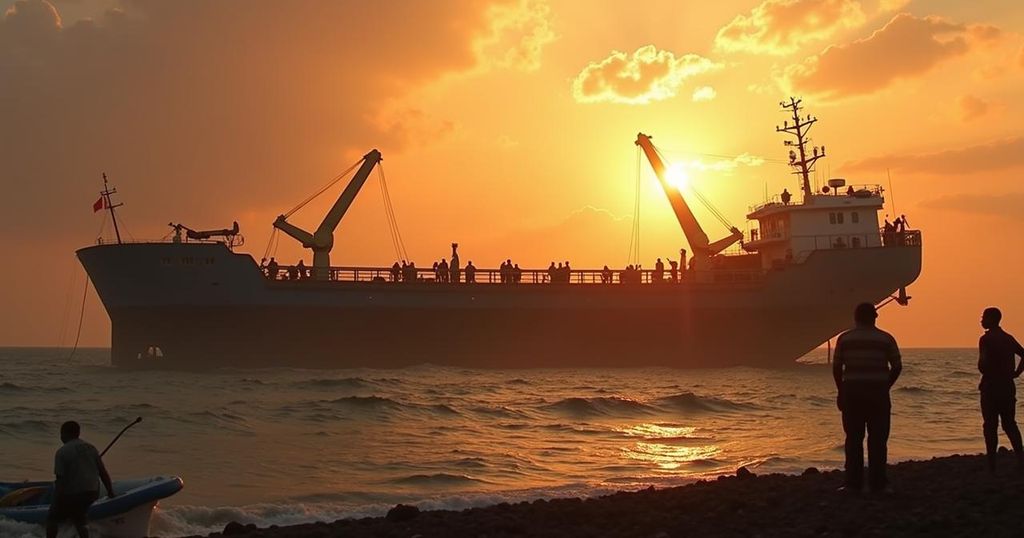Tragic Boat Capsizing Incident in Niger State Claims Lives and Highlights Safety Concerns

A tragic boat capsizing incident in Niger State, Nigeria, resulted in 14 fatalities and approximately 150 missing passengers. The overloading of the vessel is identified as the primary cause of the disaster, which happened after a religious event attended by many of the passengers. Rescue efforts continue, while concerns about safety regulations and climate change exacerbate the risks associated with maritime travel.
Nigeria has recently witnessed a tragic incident in which a boat capsized in Niger State, resulting in the recovery of 14 deceased individuals and approximately 150 passengers remaining unaccounted for. The Nigerian Emergency Management Agency reported that the capsize occurred late Tuesday, primarily due to the overloading of the vessel, which was carrying about 300 passengers who had returned from a religious celebration in the community of Gbajibo. Rescue coordination efforts continue along the River Niger, with local divers actively searching for additional survivors. Zainab Sulaiman, the emergency coordinator for Niger State, highlighted the critical situation stating, “Right now, there are 14 corpses that have been recovered, and the local divers are still in the water right now.” She cited that the frequent overloading practices, coupled with the poor condition of many boats, pose significant risks, as they often carry not only passengers but also substantial amounts of cargo. The capsizing of boats is an unfortunate common occurrence in Nigeria, where insufficient enforcement of safety regulations—including weight restrictions and mandatory life jacket use—has become a dire issue. Furthermore, it has been noted that the lack of awareness surrounding safety precautions, such as the use of life jackets, is prevalent among local populations. A Niger State official, who spoke anonymously, expressed grave concerns regarding this issue, stating, “As far as I’m concerned, there’s no one using life jackets in Niger State. You know, these are rural areas; they don’t even know what life jackets is all about.” This lack of knowledge emphasizes the urgent need for government intervention and awareness programs regarding water safety. Additionally, the broader implications of climate change, including rising water levels from increased rainfall and flooding, exacerbate the risk of such maritime accidents. Recent warnings by Nigeria’s hydrological agency regarding potential flooding risks following water releases from Chad’s Lagdo Dam underscore the urgency of this situation. The incident from last week, which also claimed the lives of over 60 farmers when their boat capsized in Zamfara State, raises significant concerns about the long-term effects of negligence and insufficient safety measures in the region.
In Nigeria, boat accidents have become alarmingly common, largely due to inadequate enforcement of safety protocols related to maritime travel. The enforcement of regulations concerning the maximum allowable capacity of vessels, along with mandatory life jacket use, is frequently ignored. Moreover, cultural tendencies among local communities often prioritize immediate travel over safety advisories, particularly warnings against nighttime river travel. This pattern of behavior, coupled with elements such as aged vessels and overloaded cargo, raises fundamental questions about the effectiveness of current regulatory frameworks and the overall safety of passengers utilizing water transport in Nigeria. Furthermore, climate change also contributes to these challenges by elevating water levels and increasing flooding risks, amplifying the dangers faced during maritime endeavors in rural areas. This necessitates stronger law enforcement and community education on safety practices.
In summary, the recent boat tragedy in Niger State serves as a stark reminder of the pressing safety concerns surrounding maritime travel in Nigeria. With 14 confirmed fatalities and approximately 150 individuals still unaccounted for, there is an urgent call for improved safety regulations and enforcement to prevent such incidents in the future. Efforts must also be directed towards community education regarding the importance of life jackets and adherence to safe traveling practices, coupled with a proactive approach in light of the challenges posed by climate change.
Original Source: www.voanews.com






